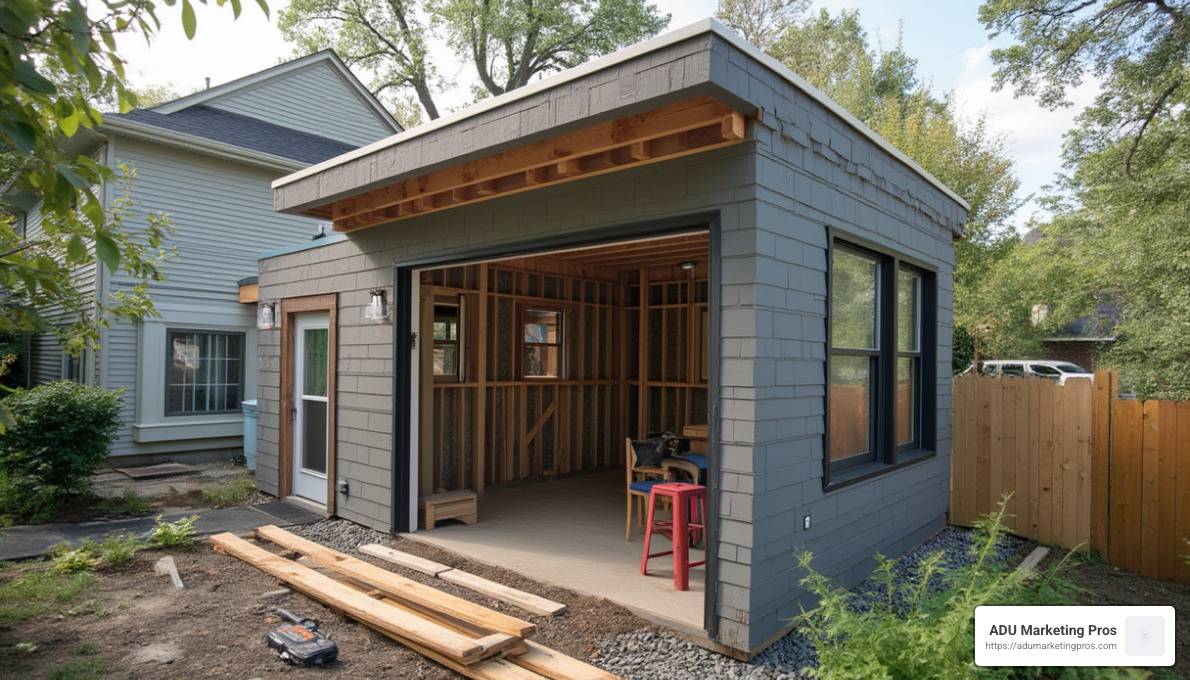ADU loan rates have become a hot topic for homeowners eager to capitalize on the growing trend of accessory dwelling units (ADUs). As small but versatile additions to your property, ADUs can provide extra living space, rental income, or improve property value. Here are some quick insights on financing options:
- Costs: ADUs vary in cost depending on design, materials, and whether they are attached or detached.
- Loan Types: Options include cash-out refinancing, home equity loans, and construction loans.
- Key Considerations: Be prepared for utility connection fees, potential property tax increases, and necessary permits.
ADUs are not just an investment in your home’s value but also a means to meet evolving housing needs. As the ADU market expands, understanding different financing pathways is crucial to making informed decisions. Stay tuned as we solve the complexities of ADU financing and help you make the best choice for your property.

Understanding ADU Loan Rates
When considering financing options for an ADU, understanding the different types of loans and their associated interest rates is crucial. Let’s explore two popular methods: Home Equity Line of Credit (HELOC) and Cash-Out Mortgage.
Home Equity Line of Credit (HELOC)
A HELOC allows homeowners to borrow against the equity in their homes. Think of it as a credit card with a revolving line of credit. You can borrow as needed and pay interest only on the amount used.
Variable Interest Rates: HELOCs typically come with variable rates, which can fluctuate over time. This means your monthly payments might change, depending on the market.
Benefits of a HELOC:
– Flexibility: Borrow funds as construction progresses.
– Interest Savings: Pay interest only on the amount drawn.
Considerations:
– Risk of Rate Increases: Variable rates can lead to higher payments if interest rates rise.
– Home as Collateral: Your home secures the loan, so defaulting could risk foreclosure.

Cash-Out Mortgage
A cash-out refinance involves replacing your existing mortgage with a new, larger one, allowing you to “cash out” the difference. This option gives you access to cash for your ADU project while consolidating your debt into a single loan.
Fixed Interest Rates: Unlike HELOCs, cash-out refinances usually offer fixed rates, providing predictable monthly payments over the loan’s term.
Advantages of a Cash-Out Refi:
– Stable Payments: Fixed rates mean consistent monthly payments.
– Potentially Lower Rates: If current rates are lower, you might save on interest over time.
Drawbacks:
– Extended Loan Term: You might end up paying your mortgage for a longer period.
– Immediate Interest Accrual: Interest starts accruing on the full loan amount right away.

Both HELOCs and cash-out refinances offer unique benefits and drawbacks. Choosing the right option depends on your financial situation and future plans. With a clear understanding of these ADU loan rates, you can make informed decisions that align with your goals.
Next, we’ll explore top financing options for ADUs, including specialized renovation loans and their benefits.
Top Financing Options for ADUs
When it comes to financing your ADU, there are several loan products to consider. Let’s take a closer look at two standout options: the Fannie Mae HomeStyle Renovation Loan and the Freddie Mac ChoiceRenovation Loan.
Fannie Mae HomeStyle Renovation Loan
The HomeStyle Renovation Loan is ideal for homeowners looking to bundle the cost of their ADU with their primary mortgage. This loan covers both the purchase (or refinance) and the renovation costs.
Pros:
– Fixed Interest Rate: Offers stability with consistent monthly payments.
– High Loan-to-Value Ratio: Can finance up to 97% of the future value of your property.
– Comprehensive Funding: Often covers the entire ADU construction cost.
Cons:
– Detailed Requirements: Requires plans and contractor bids before approval.
– Draw System: Funds are released in stages, which might limit construction flexibility.
Borrower Considerations:
This loan is perfect for those who want to lock in a fixed rate and have detailed renovation plans ready. It’s beneficial if you have limited cash but substantial equity in your property.
Freddie Mac ChoiceRenovation Loan
Similar to the HomeStyle option, the ChoiceRenovation Loan is designed for homeowners who want to add an ADU as part of a home purchase or refinance. It also allows you to factor in potential rental income from the ADU.
Pros:
– Rental Income Consideration: Allows potential ADU rental income to help qualify for the loan.
– Subject To Appraisal: Appraises the property as if the ADU is already built, which can increase borrowing power.
– High Loan-to-Value Ratio: Also supports up to 97% financing based on future property value.
Cons:
– Complex Approval Process: Requires detailed plans and licensed contractor bids.
– Staged Funding: Uses a draw system, impacting how and when contractors get paid.
Borrower Considerations:
This loan is advantageous if you plan to rent out the ADU and wish to use that income to qualify. It suits borrowers with a clear vision for their ADU and the patience for a more complex application process.
Both the Fannie Mae HomeStyle and Freddie Mac ChoiceRenovation loans offer robust financing solutions for ADU projects. They each come with unique benefits and challenges, making it essential to evaluate your specific needs and financial situation.
Next, we’ll dig into the factors that influence ADU loan rates, helping you further steer your financing journey.
Factors Influencing ADU Loan Rates
When you’re looking to finance an ADU, understanding what influences ADU loan rates is crucial. These rates aren’t just pulled out of thin air; they’re determined by a few key factors. Let’s break them down:
Property Value
The value of your property plays a big role in determining your loan rate. Lenders see a high property value as a sign of security. It means there’s a good chance they’ll get their money back. If your property is worth more, you might get a better rate.
Think of it like this: a home valued at $1,000,000 with a lot of equity is less risky for lenders than a home valued at $500,000 with little equity. The higher the value, the more favorable your loan terms might be.
Credit Score
Your credit score is like a financial report card. Lenders use it to gauge how likely you are to repay the loan. A higher credit score can open the door to lower interest rates.
Scores above 720 are considered strong and can lead to better terms. If your score is lower, you might face higher rates. But don’t worry—there are ways to improve your score, such as paying down debt or correcting errors on your credit report.
Loan-to-Value Ratio (LTV)
The loan-to-value ratio is the percentage of a property’s value that’s financed by a loan. For example, if your home is valued at $1,000,000 and you have a $550,000 mortgage, your LTV is 55%.
Most lenders are comfortable with an LTV up to 80-90%. A lower LTV means you have more equity in your home, which can lead to better loan rates. If your LTV is too high, you may face higher rates or even struggle to get approved.
These three factors—property value, credit score, and LTV—are essential to understand when seeking financing for your ADU. They help lenders assess risk and determine the rates they offer.
Next, we’ll answer some of the most frequently asked questions about ADU loan rates, including which loan types might be the best fit for your needs.
Frequently Asked Questions about ADU Loan Rates
What is the best type of loan for an ADU?
Choosing the right loan for your ADU project depends on your financial situation and goals. Two popular options are home equity loans and construction loans.
Home Equity Loan: This option is great if you have significant equity in your home. It provides a lump sum at a fixed interest rate, making budgeting easier. However, it requires you to have enough equity to cover your ADU costs.
Construction Loan: These are custom for building projects and cover labor and materials. They offer flexible repayment options but can be more complex to manage due to the draw system for funds distribution.
Can I use rental income from an ADU to qualify for a loan?
Yes, you can! According to Freddie Mac guidelines, potential rental income from an ADU can be considered when qualifying for a loan. This means that lenders might look at the anticipated income your ADU could generate, which could increase your borrowing power.
This approach is particularly useful for those looking to maximize their loan amount, as it allows the projected rental income to be part of the financial equation.
Are there any hidden costs when building an ADU?
Building an ADU involves more than just construction costs. Be prepared for several potential hidden expenses:
-
Utility Fees: Connecting your ADU to water, sewer, and electricity can be costly, especially if extensive infrastructure work is needed.
-
Property Taxes: An ADU can increase your property’s value, which might lead to higher property taxes.
-
Permitting Fees: Depending on your location, obtaining necessary permits can vary in cost and complexity. It’s essential to understand local regulations to avoid unexpected expenses.
By being aware of these potential costs, you can plan your budget more effectively and avoid surprises down the road. Next, we’ll wrap up with how ADU Marketing Pros can help you steer these financial waters.
Conclusion
Navigating the financial landscape of ADU construction can be challenging, but that’s where we at ADU Marketing Pros come in. Our mission is to empower ADU construction and architecture firms by providing personalized financing solutions and expert guidance to help you stand out in a competitive market.
Personalized Financing Solutions
We understand that every ADU project is unique. That’s why we offer custom financing strategies that align with your specific needs and goals. Whether you’re considering a home equity loan or a construction loan, our team can help you explore the best options for your situation. By leveraging our expertise, you can make informed decisions that maximize your financial potential.
Expert Guidance
Our team is committed to guiding you through the complexities of ADU financing. From understanding ADU loan rates to navigating hidden costs, we provide the insights and support you need to succeed. We stay on top of the latest market trends and regulations, ensuring that you have access to the most current information and resources.
By partnering with ADU Marketing Pros, you gain more than just a marketing ally. You gain a trusted advisor who is dedicated to helping your business grow and thrive in the booming ADU sector.
Ready to take the next step? Let us help you open up new opportunities with our specialized marketing solutions. Together, we can drive measurable growth for your firm and establish a strong, recognizable brand identity in the ADU market.
Feel free to reach out to us for a consultation. Let’s transform your ADU business into a market leader.




